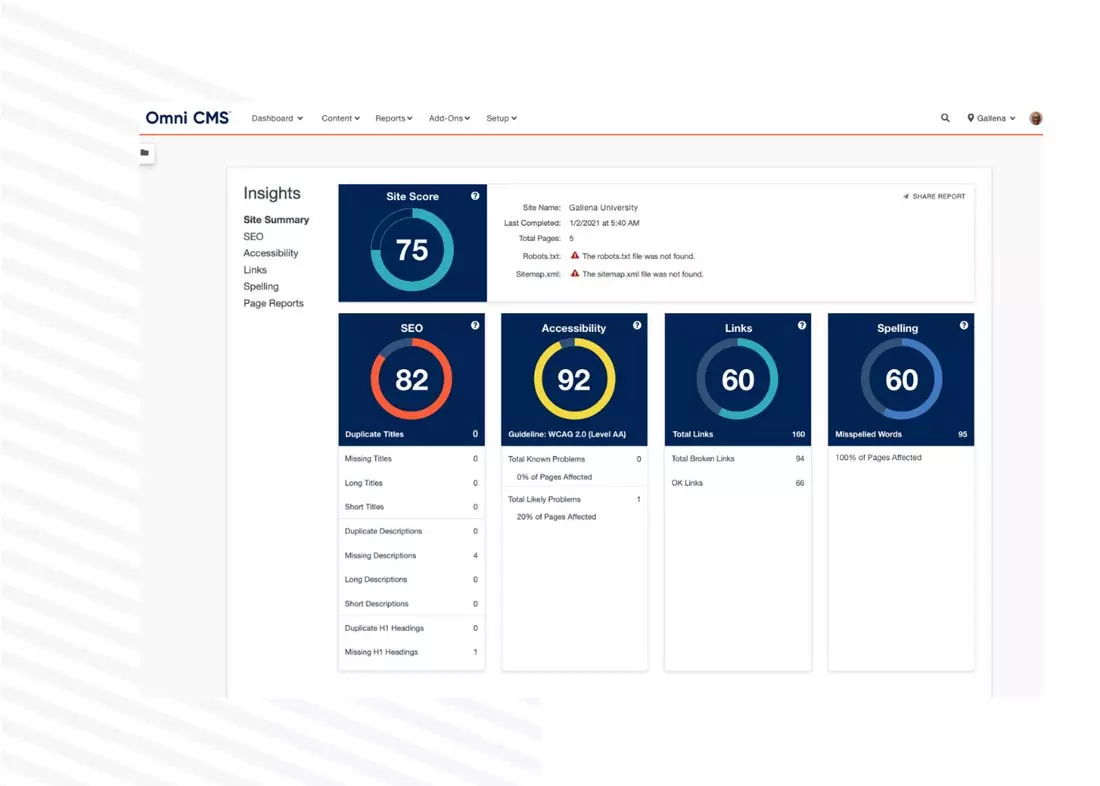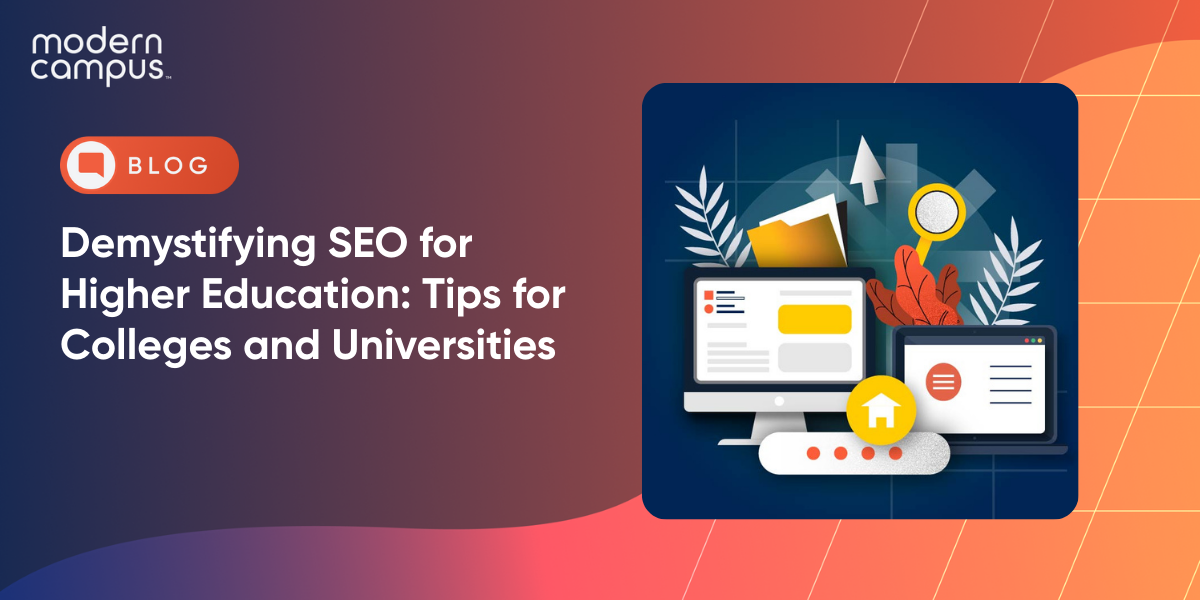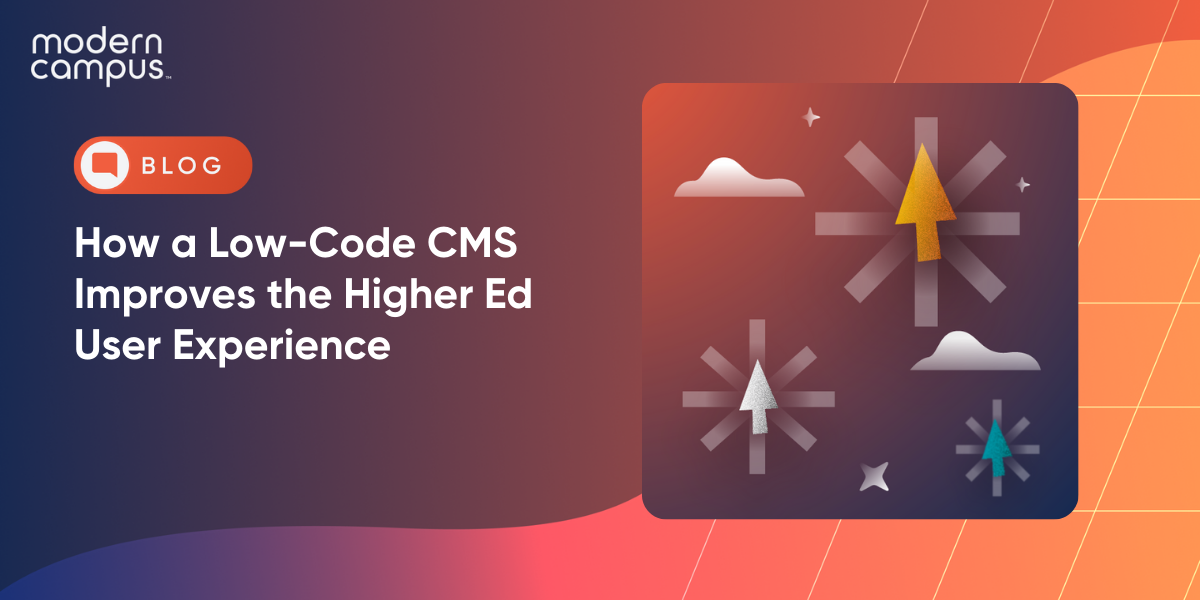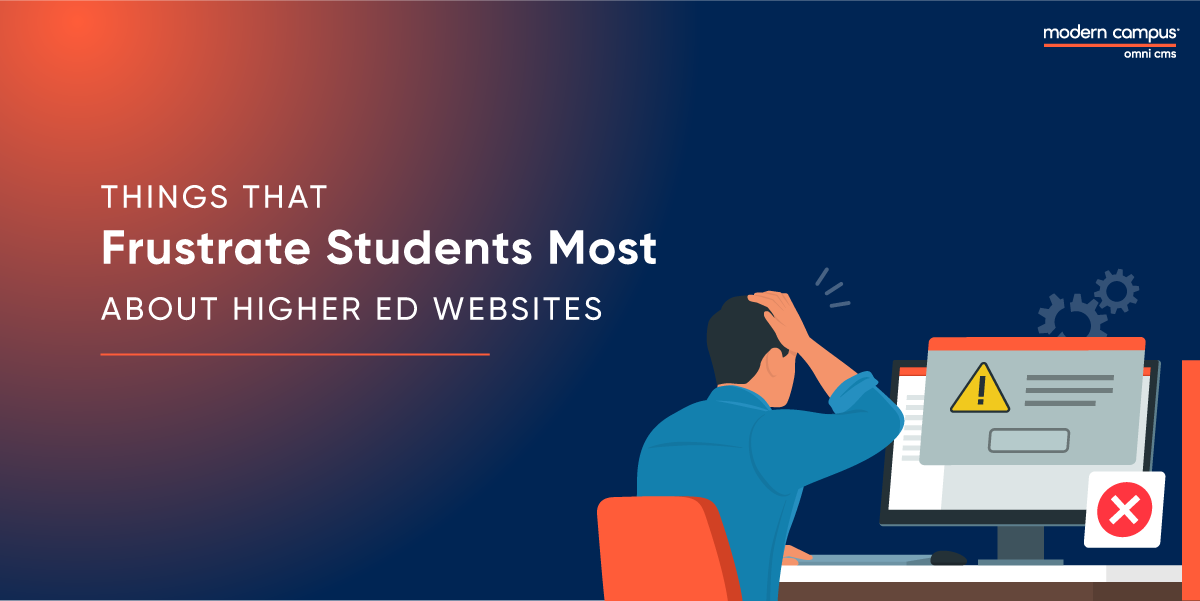Demystifying SEO for Higher Education: Tips for Colleges and Universities
Higher education SEO is evolving rapidly with AI-driven search changes, but strategic optimization remains vital for student recruitment success.
- Modern institutions are achieving enrollment growth and increasing website traffic through comprehensive SEO strategies
- Voice search optimization and AI-powered features like Google's AI Overviews now require conversational, question-based content approaches
- Case studies show that systematic SEO implementation can increase campus page traffic and boost inquiries
- Success requires combining traditional SEO fundamentals with emerging trends like schema markup, video optimization, and local SEO for multi-campus institutions
Institutions that adapt their SEO strategies for AI-powered search while maintaining strong technical foundations will dominate student recruitment in 2025 and beyond.
Attracting and enrolling students in the modern era is challenging when you're using outdated tactics.
Every year, fewer traditional students progress from high school to college. The market for prospective learners gets more competitive. Modern students behave like customers and conduct research online before making an enrollment decision.
With these factors, your college or university must invest in its digital presence. Implementing strategic SEO tactics can significantly benefit your higher education website and student recruitment efforts.
But higher education SEO in 2025 looks dramatically different than it did just two years ago. With AI-powered search features, voice queries, and changing user behaviors, institutions need strategies that work for both traditional search engines and emerging AI platforms.
What Is SEO, and Why Is It Critical for Higher Education Success?
If you want to attract more organic traffic to your website, you need to get serious about a search engine optimization (SEO) strategy. SEO is a way to optimize your website so that when search engines crawl your pages, they can identify the purpose of specific pages and catalog them so that they show up on the search engine result pages (SERP).
One true measure of SEO strategies for higher education is whether your website appears on page one in the top three organic search results. The top result listed in a Google search has an average click-through rate of 22.4%.
But here's what's changed: students now expect instant, personalized answers to their questions. Research shows that 70% of prospective students expect higher education websites to provide personalized information, and institutions using web personalization solutions experience up to a 2700% increase in student inquiry conversions.
With college enrollment declining since 2010, institutions that master SEO gain a significant competitive advantage in student recruitment.
How Can You Build a Winning Higher Education SEO Strategy?
A well-planned and streamlined search engine optimization strategy focuses on various on-page, off-page, content and technical aspects of a college website. Here are the essential components you need for success in 2025:
![]()
Should You Start with Keyword Research or Search Intent?
Search intent is the why behind a search query. It's understanding what a searcher was looking for when they typed certain keywords, helping you understand your target audience.
Search methods have evolved with AI-powered capabilities. Through strategic keyword research, you can find the optimal keywords relevant to your prospective students, anticipating what they want and providing it before they even realize it. Leverage SEO tools to identify relevant keywords for your target audience, and then prioritize the ones unique to your institution.
Modern Keyword Strategy: Focus on both traditional and long-tail keywords that reflect how students actually search. Consider question-based phrases and natural language queries that align with voice search trends and AI-powered features.
What Technical SEO Elements Drive Higher Education Success?
Technical SEO is key to maintaining your website's backend health. Your SEO strategy's groundwork consists of dozens of technical components.
Essential technical elements for 2025:
- HTTPS security certification
- Mobile-first responsive design
- Core Web Vitals optimization (page speed, interactivity, visual stability)
- XML sitemaps for all content types
- Schema markup for programs, events, and faculty profiles
- Clean URL structure that's descriptive and concise
- Accessibility compliance following WCAG 2.1 guidelines
These pieces guarantee that your website can be identified by search engines and provide an excellent user experience, helping institutions achieve greater organic traffic and conversions.
How Do You Create Content That Ranks and Converts?
Creating exceptional content remains the single best way to boost your SEO. It's also the best way to satisfy prospective students because you're giving them the information they want.
Content strategy for modern higher education SEO:
Program-Specific Content: Create dedicated landing pages for each academic program with detailed information about curriculum, career outcomes, faculty expertise and student success stories.
Question-Based Content: Structure your content to answer specific questions students ask during their research process. Use tools like Answer the Public to identify common queries related to your programs.
Multimedia Integration: Include videos, infographics and interactive content. Video content drives better engagement and helps students envision themselves on campus.
Pay special attention to academic program pages where basic information stays relatively static. Add new photos, faculty spotlights, student success stories or other features to keep these pages fresh and engaging.
Why Are Student Testimonials Essential for SEO Success?
Customers are inclined to trust what their peers say over what a business claims, and the same holds true for students. Testimonials are social proof, making them one of the most valuable additions to your website.
By collecting and strategically placing student testimonials throughout your website, you can reach the right target audience. Optimizing your testimonial page for SEO with relevant keywords and structured data markup is also important to ensure its performance.
What's the Best Approach to Link Building for Higher Education?
Backlinks (hyperlinks from other websites to yours) are the core of off-page SEO efforts. Quality backlinks from authoritative sites signal to search engines that your website is trustworthy and valuable.
Higher education link-building strategies:
Academic Partnerships: Collaborate with other educational institutions, research organizations and academic publications for natural link opportunities.
Faculty Expertise: Promote faculty as thought leaders in their fields. When professors are quoted in news articles or contribute to industry publications, these snippets create valuable backlinks.
Alumni Network: Encourage successful alumni to link back to your programs when they share their career achievements online.
Publishing link-worthy thought leadership content and tapping into your alumni and faculty network are proven ways to build quality backlinks for your higher ed website.
Real Higher Education SEO Success Stories: What Actually Works
Let's examine specific case studies that demonstrate the power of strategic SEO implementation for higher education.
How Did a Florida University Transform Its Digital Presence?
Florida Gulf Coast University (FGCU) faced a challenge familiar to many regional institutions: competing against much larger in-state schools for student attention. Their solution? A comprehensive SEO strategy built on technical excellence and systematic implementation.
The Challenge: FGCU's legacy content management system didn't support mobile responsiveness, lacked flexibility for integrations and had no built-in quality checks for SEO consistency.
The Strategy: Director of Digital Communications Jeffrey Garner partnered with Modern Campus to implement a comprehensive website and CMS focused on SEO optimization. The approach included:
- Restructuring website templates to feature search engine-preferred architecture
- Implementing comprehensive navigational improvements
- Reworking data structure for images, file names and metadata
- Training 196 content contributors on SEO best practices
- Creating templates that force editors to complete required SEO fields
The Impact: FGCU achieved significant increases in both student site visits and donor engagement. The systematic approach ensured that every page maintained SEO consistency, helping search engines find the correct content every time. The institution now has a future-proof website with built-in SEO optimization that scales across all content contributors.

How Do Multi-Campus Institutions Succeed with Local SEO?
Regional universities with multiple locations face unique SEO challenges but can achieve results through location-specific optimization strategies:
Strategic Approach:
- Creating dedicated landing pages for each campus location
- Optimizing for local search terms, combining programs with geographic modifiers
- Implementing Google Business Profile optimization for each campus
- Developing location-specific content highlighting unique programs and community partnerships
Measurable Benefits: Institutions implementing comprehensive local SEO strategies typically see improved visibility in location-based searches and stronger connections with their local communities.
How Do Small Institutions Compete with Major Universities?
Regional and smaller institutions can achieve remarkable growth through strategic content optimization, even when competing against prestigious state universities:
Successful Strategy Elements:
- Identifying and targeting long-tail keywords with high intent but lower competition
- Creating comprehensive program guides that answered every question prospective students might have
- Developing relationships with local news outlets for consistent media coverage and backlinks
- Optimizing for voice search with conversational content
Competitive Advantages: Smaller institutions often have unique advantages in targeting niche keywords, building strong local community connections and providing more personalized student experiences that can be effectively showcased through SEO-optimized content.
What Are the Essential SEO Trends for Higher Education in 2025?
SEO continues evolving. Here are the most critical trends affecting higher education:
How Is AI Changing Higher Education Search?
Google's AI Overviews and emerging AI search platforms like ChatGPT Search are transforming how students discover information. AI chatbots now represent nearly 3% of search engine traffic and are growing.

Optimization strategies for AI search:
Structured Data Implementation: Use schema markup for programs, events, faculty profiles and campus information. This data helps AI systems understand and properly present your content.
Conversational Content Creation: Write content that answers questions the way people naturally ask them, such as "What are the best nursing programs in California with high job placement rates?" instead of simply "nursing programs California."
Authority Signals: AI systems prioritize content from authoritative sources. Ensure your content demonstrates expertise through faculty credentials, accreditation information and student outcome data.
Research indicates that 47% of marketers understand how to incorporate AI into their marketing strategy, with many implementing AI-powered optimization tools.
Why Is Local SEO Critical for Higher Education?
With students considering options close to home, local SEO has become essential for attracting regional students.
Local SEO best practices:
Google Business Profile Optimization: Maintain complete, accurate profiles for each campus location with updated hours, contact information and regular posts about campus activities.
Location-Based Content: Create content specific to your geographic region, including local internship opportunities, community partnerships and regional career outcomes.
Local Link Building: Partner with local businesses, government organizations and community groups for natural link-building opportunities.
What Role Does Video SEO Play in Student Recruitment?
Video content has become essential for higher education marketing, with students rating video highly as a way to learn about colleges and universities.
Video SEO optimization strategies:
Optimized Titles and Descriptions: Use keyword-rich, descriptive titles that reflect student search intent.
Transcript Integration: Include full transcripts to provide additional indexable text content.
Strategic Hosting and Embedding: Host videos on platforms like YouTube for broader reach while embedding them on relevant program pages.
Schema Markup: Implement video schema markup to help search engines understand and display your video content appropriately.
Understanding what frustrates students about higher education websites can guide your SEO and content strategy to better meet their expectations.
How Should You Measure Your Higher Education SEO Success?
It's one thing to implement an SEO plan, but understanding whether you're achieving results requires measurement and analysis.
What Tools Provide the Best SEO Insights?
Google Analytics remains the foundation for SEO measurement, providing comprehensive data about website performance and user behavior. Start by integrating Google Analytics before any major changes to establish baseline performance metrics.
Google Search Console complements Analytics by showing which questions prospective students use to find your website and providing detailed crawl and index information for your pages.
Advanced SEO tools for higher education:
- SEMrush or Ahrefs: Comprehensive keyword research, competitor analysis and backlink tracking
- Screaming Frog: Technical SEO audits and site crawling analysis
- Modern Campus CMS Insights module: Built-in SEO monitoring specifically designed for higher education websites

The Modern Campus CMS Insights module monitors your website’s health in key areas including SEO, accessibility, spelling, and links. With this built-in monitoring, your CMS administrators and digital marketing team can easily identify and improve areas that critically impact visitor experience and search visibility.
Which Metrics Matter Most for Higher Education?
Focus on metrics that directly correlate with your enrollment and engagement goals:
Traffic Quality Metrics:
- Organic traffic growth for program-specific pages
- Click-through rates from search results
- Time spent on key landing pages
- Conversion rates from organic visitors to inquiries
Search Performance Indicators:
- Keyword rankings for priority terms
- Featured snippet appearances
- Local search visibility for campus-related queries
- Voice search optimization performance
Does Your Website Structure Impact SEO Performance?
Navigation plays a distinct role in your website's SEO performance. You want prospective students to find information quickly, and you want search engine crawlers to easily discover and catalog your website pages.
Strategic website structure optimization:
Internal Linking Strategy: Link to primary internal pages throughout your website, ensuring that important program pages receive adequate link equity from other pages.
Header and Footer Optimization: Include the most important links in your top menu and footer so they appear on every page, signaling their importance to search engines.
URL Best Practices: Keep your URLs concise and descriptive. Aim for 59 characters or less to ensure they display properly in search results and are easy for users to read and remember.
Breadcrumb Navigation: Implement clear breadcrumb navigation to help both users and search engines understand your site hierarchy and content relationships.
For deeper insights into website structure optimization, explore our comprehensive college website redesign guide. You can also find inspiration in our analysis of top higher education websites that excel in both design and SEO performance.
Is Higher Education SEO a One-and-Done Project or Ongoing Process?
SEO is definitely not something you implement and forget. SEO for institutions must be an ongoing process if you expect to see sustained results and adapt to changing search algorithms.
Building sustainable SEO practices:
Editorial Calendar Integration: Build SEO considerations into your content planning process, ensuring that every piece of content serves both user needs and search optimization goals.
Regular Technical Maintenance: Schedule quarterly technical SEO audits to identify and resolve issues before they impact your search performance.
Performance Monitoring: Set up automated reporting to track key metrics and identify trends that require attention or adjustment.
Team Training and Development: Ensure that content creators across departments understand and can implement basic SEO best practices in their work.
Frequently Asked Questions About Higher Education SEO
How long does it take to see results from higher education SEO efforts? SEO results vary depending on factors like current website authority, competition level and the comprehensiveness of optimization efforts. While some institutions may see initial improvements relatively quickly, building meaningful organic traffic and search visibility is typically a long-term investment that requires consistent effort and patience.
What's the biggest SEO mistake institutions make? The most common mistake is treating SEO as a one-time project rather than an ongoing process. Search algorithms constantly evolve, and competitor activities change regularly. Successful institutions maintain consistent optimization efforts and adapt to new trends like AI-powered search features.
How important is local SEO for colleges and universities? Local SEO is extremely important, especially for regional institutions and those with multiple campus locations. Students often search for programs "near me" or in specific cities. Optimizing for local search can increase visibility among prospective students in your geographic area.
Can small colleges compete with major universities in search results? Absolutely. Small institutions often have advantages in targeting specific, long-tail keywords and building closer community relationships for link building. The key is identifying your unique value propositions and optimizing for keywords where you can realistically compete and win.
How do AI search features impact higher education SEO strategy? AI search features like Google's AI Overviews require content that directly answers questions in a conversational format. Institutions should focus on creating comprehensive, authoritative content that uses natural language and provides complete answers to student questions. Schema markup and structured data become even more important for helping AI systems understand and present your content appropriately.
Creating Lasting Impact Through Strategic SEO
There's no avoiding the constant maintenance required to keep your website current and optimized for search engines. However, when you build SEO processes into your routine workflows, you'll begin to notice how small improvements create significant implications for your college or university's digital presence.
Success in higher education SEO requires balancing traditional optimization fundamentals with emerging trends like AI search optimization, voice query targeting and multimedia content strategies. Institutions that master this balance position themselves to capture more qualified prospective students and build sustainable competitive advantages.
Modern Campus offers comprehensive solutions designed specifically for higher education, combining powerful content management tools with built-in SEO optimization features that help institutions like yours achieve measurable enrollment growth. Contact our team to discover how Modern Campus can help you implement a winning higher education SEO strategy that drives real results for your institution.
Website Design & Personalization
Last updated: August 28, 2025



